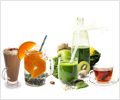The increase in the consumption of sugar-sweetened beverages over the last several decades may be responsible for insulin resistance, a precursor to Type 2 diabetes, a new study has suggested.
The study was conducted by researchers at the USDA Human Nutrition Research Center on Aging (USDA HNRCA) at Tufts University.The research was carried out on 2,500 healthy men and women in the Framingham Offspring Study, a community-based study of cardiovascular disease among offspring of people in the original Framingham Heart Study.
Participants reported their usual dietary intake for the previous year, which researchers used to determine average intakes of sugar-sweetened drinks (regular and caffeine-free colas and other carbonated beverages containing sugar), diet soft drinks (low-calorie colas with and without caffeine and other low-calorie carbonated beverages), and fruit juice (e.g., apple juice or apple cider, orange juice, and grapefruit juice).
One serving of a sugar-sweetened drink or diet soda was considered equivalent to 12 fluid ounces, or a regular-sized can of soda. One serving of fruit juice was considered equivalent to six fluid ounces.
The researchers obtained blood samples from participants who fasted for at least eight hours, and measured the participants’ blood levels of insulin as well as glucose. High fasting glucose levels, like high fasting insulin levels, are a pre-cursor to Type 2 diabetes.
Senior author Paul Jacques, DSc, director of the Nutritional Epidemiology Program at the USDA HNRCA and professor at the Friedman School of Nutrition Science and Policy at Tufts University said that the researchers had found that participants who consumed two or more sugar-sweetened beverages per day had significantly higher fasting blood levels of insulin.
Advertisement
“However, participants consuming two or more daily servings of 100 percent fruit juice had modestly lower fasting glucose levels, compared with those who did not consume fruit juice,” he added.
Advertisement
They were less likely to smoke than non-consumers, and consumed diets relatively lower in saturated fat and higher in total fiber.
However, Jacques and Nicola McKeown, PhD, corresponding author and scientist in the Nutritional Epidemiology Program at the USDA HNRCA, do not advise increasing consumption of fruit juice.
This study, published in the September issue of The Journal of Nutrition, was supported by the U.S. Department of Agriculture’s Agricultural Research Service; the Framingham Heart Study of the National Heart, Lung, and Blood Institute of the National Institutes of Health; and individual awards from the American Diabetes Association and the American Heart Association.
Source-ANI
LIN/J











